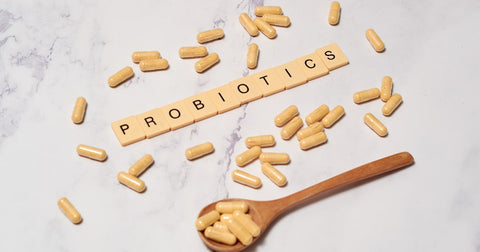In the pursuit of optimal health, nurturing your gut microbiome has taken center stage. Probiotics, the "good" bacteria, have garnered much attention, but their lesser-known partners, prebiotics, are equally crucial.
Prebiotic supplements provide essential nourishment for these beneficial bacteria, fostering a thriving gut ecosystem. But with a plethora of prebiotic fiber supplements and brands flooding the market, choosing the best one can be overwhelming.
If you're seeking to optimize your gut health, this guide will navigate you through the world of prebiotics, highlighting the best options, their benefits, and how they can empower your overall well-being.

What are Prebiotics? The Fuel for Your Gut Microbiome
Prebiotics are a type of dietary fiber that your body can't digest. Instead, they serve as food for the beneficial bacteria residing in your gut – the probiotics. Think of prebiotics as fertilizer for your gut garden, promoting the growth and activity of these good bacteria.
Prebiotics Supplements: Convenient Gut Nourishment
While prebiotics are naturally found in certain foods like onions, garlic, bananas, and asparagus, supplementing with prebiotic fiber supplements can be a convenient way to ensure you're getting enough of these gut-nourishing compounds.
Best Prebiotic Supplement: Choosing Wisely

With a growing market of prebiotic supplements, making the right choice can be daunting. To help you narrow down your options, look for products that prioritize these qualities:
High-Quality Ingredients:
Some popular supplements boast clinically-backed prebiotic fibers like:
- Inulin: Often derived from chicory root, it's well-researched for promoting gut health. Brands like NOW Foods Inulin or Jarrow Formulas Inulin FOS are popular choices.
- Fructooligosaccharides (FOS): Found in some fruits and vegetables, FOS is a prebiotic readily fermented by gut bacteria. Garden of Life Dr. Formulated Prebiotic Fiber features FOS.
- Galactooligosaccharides (GOS): GOS is another type of prebiotic fiber that supports gut health. It's often found in supplements combined with other prebiotics, like in Love Wellness Good Girl Probiotics.
Strain Diversity:
A mix of different prebiotic fibers nourishes a wider variety of gut bacteria. Supplements like Seed Daily Synbiotic or Hyperbiotics Prebiotic Powder offer a diverse blend of prebiotics.
Third-Party Tested:
Quality and purity are essential. Reputable brands like Thorne FiberMend or Pure Encapsulations Prebiotic provide third-party lab testing to verify their claims.
Suitable for Your Needs:

Consider any dietary preferences or restrictions:
- Vegan: Most prebiotic supplements are plant-based, but double-check labels. Micro Ingredients Organic Prebiotic Powder is a popular vegan option.
- Gluten-Free: Many prebiotic supplements are naturally gluten-free. Garden of Life Dr. Formulated Organic Prebiotic Fiber is an excellent choice for those with gluten sensitivity.
Prebiotic Yogurt: A Tasty Way to Boost Gut Health
If you're looking for a delicious way to incorporate prebiotics into your diet, consider prebiotic yogurt. These yogurts are enriched with prebiotic fibers, providing a dual benefit for your gut:
- Probiotics: Yogurt naturally contains live cultures of beneficial bacteria.
- Prebiotics: The added prebiotic fibers nourish these bacteria, helping them flourish and support a healthy gut environment.
Best Prebiotic for Women: Addressing Specific Needs
Women's gut health is influenced by hormonal fluctuations, stress, and lifestyle factors. When choosing a prebiotic supplement, consider your unique needs:
- Digestive Health: If you're struggling with bloating, constipation, or other digestive woes, look for prebiotics that promote regularity and overall gut balance.
- Immune Support: Choose a supplement that supports a strong immune system by nourishing beneficial bacteria.
- Hormone Balance: Some prebiotics may indirectly support hormonal health by promoting gut health, which plays a role in hormone metabolism and regulation.
Food Intolerances: Impact on Gut Health

If you experience persistent digestive issues, food intolerances might be contributing to an imbalance in your gut microbiome. Identifying and avoiding trigger foods can be crucial for achieving optimal gut health and overall wellness.
A food sensitivity test kit can help you pinpoint specific foods that might be causing your discomfort, empowering you to make informed dietary choices.
Key Takeaways
- Prebiotics are essential for nourishing the beneficial bacteria in your gut.
- Choosing high-quality prebiotic supplements or incorporating prebiotic-rich foods like yogurt can support your gut health.
- Consider your individual needs and choose a prebiotic that aligns with your goals.
- If you experience persistent digestive issues, consider a food sensitivity test to identify potential trigger foods.
Remember, a healthy gut is the foundation of a healthy you. By prioritizing gut health and incorporating prebiotics into your routine, you're taking a proactive step toward optimal wellness.
Frequently Asked Questions:
1. Can I take prebiotics if I have IBS?
Yes, prebiotics can be beneficial for people with IBS, as they can help improve gut health and reduce symptoms like bloating and gas. However, it's essential to start slowly and gradually increase your intake to avoid any potential discomfort. If you're unsure, consult your doctor or a registered dietitian.
2. How long does it take to see results from taking prebiotics?
The time it takes to experience noticeable benefits from prebiotics can vary depending on the individual and the specific health concerns. Some people might notice improvements in digestion or regularity within a few days, while others might take weeks or even months to see significant changes.
3. Can I take prebiotics and probiotics together?
Yes, taking prebiotics and probiotics together is actually encouraged! Prebiotics provide nourishment for the probiotics, helping them thrive and colonize your gut more effectively. This synergistic combination is often referred to as a "synbiotic."
4. Are there any side effects of taking prebiotic supplements?
Prebiotics are generally safe and well-tolerated. However, some people might experience mild side effects like gas, bloating, or diarrhea, especially when first starting to take them or if they take too much. It's best to start with a lower dose and gradually increase it as your body adjusts.
5. I'm confused about the difference between prebiotics and probiotics. Can you explain?
Prebiotics are non-digestible fibers that act as food for the beneficial bacteria (probiotics) in your gut. Probiotics, on the other hand, are the actual live microorganisms that confer health benefits. Think of prebiotics as the fertilizer that helps your gut garden flourish, while probiotics are the plants themselves.


.png?v=1737390083)
.png?v=1737187409)


